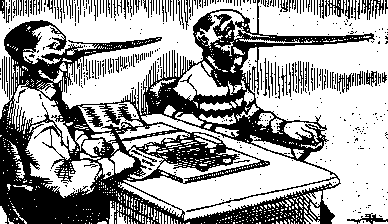Research
Interests
LIE DETECTION
This LIE DETECTION section is
divided into three subsections. For the rationale of this division, see
Table 1 of:
http://www.psych.utoronto.ca/~furedy/Papers/
ld/North%20American%20Polygraph%20and%20Psychophysiology.doc
- The Pseudo-Scientific North American Polygraph for Detecting Guilt
- Does a Lie Detector Really Tell the Truth Sunday Star March 24, 1985
- Countering Confessions Induced by the Polygraph: Of Confessionals and Pschologica; Rubber Hoses (1986)
- Psychology Professor Crusades Against Use of Lie Detector Published in the UofT Bulletin, 1988, April 4 issue.
- Validity of the Lie Detector: A Psychophysiological Perspective (1988)
- The North American CQT Polygraph and the Legal Profession: A Case of Canadian Credulity ans a Cause for Cultural Concern (1989)
- The Forensic Use of the Polygraph: A Psychophyiological Analysis of Current trends and Future Prospects a 1991 chapter in Advances in Psychophysiology by John Furedy and Ronald Heslegrave.
- Reply by Furedy and Heslegrave to comments by other authors on their "The Forensic Use of the Polygraph..." chapter This reply was entitled "Some Elaborations on the Specific-Effects Orientation's Application to North American CQT Polygraphs
- Alice-in-Wonderland Terminological Usage in, and Communicational Concerns About, that Peculiarly American Flight of Technological Fancy The CQT Polygraph (1991)
- A 1993 Hostile Review of Theories and Applications in the Detection of Deception: A Psychophysiological and International Perspective, and An Invited Reply by the Book's Authors
- Paper on the CQT Polygrapher's Dilemma (1993)
- A 1993 Symposium on "The validity of the polygraph: experimental psychophysiology and pseudo-scientific polygraphy"
- Expert Testimony on Polygraph (1995)
- Lie Detectors Lie (Tell the CIA) New York Times (1995)
- Paper on the North American Polygraph and Psychophysiology (1996)
- Response to a criticism of 1993 polygrapher's Dilemma Paper (1996)
- The Detection of Lies Globe and Mail (1996)
- Letter Submitted to Science (2001)
- Thermal imaging polygraph no more valid than the current North American entrails-reading procedure (2002)
- The North American Polygraph as Entrails Reading Rather than Reliance on Valid Evidence (2002)
- Is the CQT polygraph a standardized test or a pseudo-scientific dynamic interview? (2002) For credentials of George Maasche and Drew Richardson, see www.antipolygraph.org
- Lie Detector "Useful Interrogation Prop" (2003)
- Western Australia Court Rejects Polygraph (2003)
- November, 2003 interview on TVO about lying and the North American polygraph [Use Internet Explore 6 (or above) or download and use Windows Media Player to view]
- The North American Polygraph As Entrails Reading: Lay, Legal, And Scientific Reactions (2003)
- Why you shouldn't take Lenny Briscoe's lie-detector test (2004)
- Lie Detectors: Infallible Technology or Junkscience? (2004)
- Knesset Okays Bill Prohibiting Lie Detector Test for Employees (2004)
- "Scientific and Pseudoscientific Psychophysiological Methods for Detecting Deception" Lecture/Discussion at Department of Defence Polygraph Institute, Ft. McLelland, Alabama, October 1991.
- Polygraph-related Interviews by John Furedy and Related Items (1982-2005)
- The Polygraph "Test" is Not a Test (2006)
- The Science-Based Guilty Knowledge Test (GKT) or Concealed Information Test(CIT) for Detecting Guilt
- The Roles of Decption, Intention to Deceuive, and Motivation to Avoid Detection in the Psychophysical Detection of Guilty Knowledge (1991)
- Refreshing Memory For Details Of A Mock Crime Does Not Enhance Accuracy Of A P300 Guilty Knowledge Laboratory Test (Power Point Presentation, 2004)
- Specific and Reactive Sensitivities of Skin Resistance Response and Respiratory Apnea in a Japanese Concealed Information Test (CIT) of Criminal Guilt (2004)
- P300-based Detection of Concealed Autobiographical Versus Incidentally Acquired Information in Target and Non-Target Paradigms (2006)
- The Differentiation of Deception as a Psychological Function the Significance of Which is Primarily Scientific.

"Founded on lies, it [the CQT polygraph] spreads distrust while posing as the path to truth"(attributed to John Furedy on www.antipolygraph.org)
LIE DETECTION
PSYCHOPHYSIOLOGICAL INVESTIGATIONS OF
PSYCHOLOGICAL FUNCTIONS
MERIT VS. EQUITY IN HIGHER EDUCATION
THE
NORTH AMERICAN
BIOETHICS INDUSTRY
REALISM APPLIED TO
THE DISCIPLINE OF PSYCHOLOGY
SEX DIFFFERENCES IN COGNITIVE FUNCTIONS
POLITICAL AND SOCIAL COMMENTARY
RECALLING LATE MEMBERS OF THE "DEMOCRACY OF THE INTELLECT"
DANIEL BERLYNE
(1924-76):
BIBLIOGRAPHICAL ANALYSIS
Here you can
find my
Website Designed by
Glenn Richardson
Email the Webmaster

